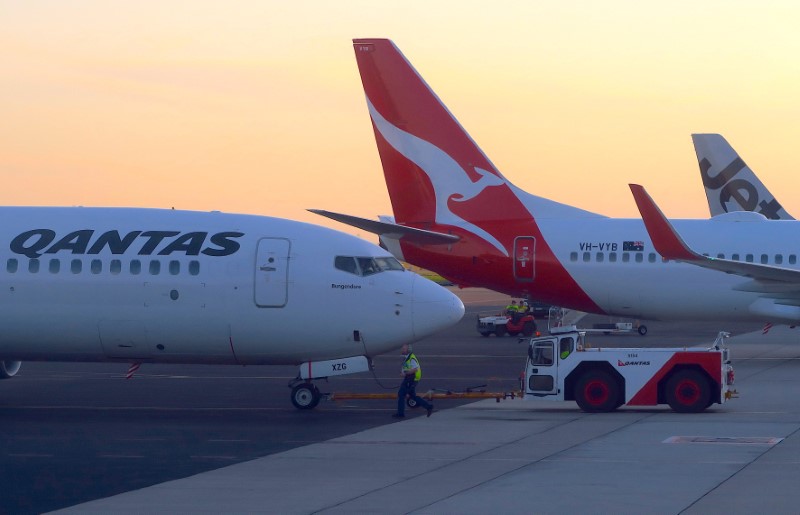By Jamie Freed and Douglas Busvine
SYDNEY/BERLIN (Reuters) - Airline industry turmoil deepened on Thursday as Qantas Airways (AX:QAN) told most of its 30,000 staff to take leave and Lufthansa (DE:LHAG) said the industry may not survive without state aid if the coronavirus pandemic lasted a long time.
The United Nation's International Civil Aviation Organization called on governments to ensure cargo operations are not disrupted to maintain the availability of critical medicine and equipment such as ventilators and masks that will help reduce the spread of virus.
"The spread of the coronavirus has placed the entire global economy and our company as well in an unprecedented state of emergency," Lufthansa CEO Carsten Spohr said in a statement. "At present, no one can foresee the consequences."
His comments echo other industry executives who have called for state support now that passenger operations are collapsing at an unprecedented rate as governments curb travel drastically and demand slumps.
Lufthansa said it had parked 700 of the group's 763 aircraft and its executive board would take a 20% pay cut. The company, which also owns Swiss International, Austrian Airlines and Brussels Airlines, said last week it was speaking to governments of countries where its units are based about possible aid.
Shares in U.S. airlines fell sharply on Wednesday after Washington proposed a rescue package of $50 billion in loans, but no grants as the industry had requested, to help address the financial impact from crisis.
The Trump administration's lending proposal would require airlines to maintain a certain amount of service and limit increases in executive pay until the loans are repaid.
Delta Air Lines (N:DAL) said on Wednesday it would park more than 600 jets, cut corporate pay by as much as a half, and scale back flying by more than 70% until demand begins to recover.
American Airlines Group Inc (O:AAL) in a memo to staff rebuffed criticism that it had rewarded its shareholders with too many dividends and stock buybacks in better times, leaving it with less cash to manage the crisis.
"Unfortunately, this is no ordinary rainy day," said Nate Gatten, American's senior vice president global government affairs. "These are extraordinary circumstances, and additional support is necessary to protect jobs and ensure that the flying public can continue to rely on our industry after the crisis ends."
In Australia, Qantas said it would cut all international flights and two-thirds of its 30,000 workers would need to take paid or unpaid leave. The Australian government is banning the arrival of non-citizens and non-residents starting Friday.
GOVERNMENT RELIEF
Several governments have started to act.
Government sources in India told Reuters that the government was planning a rescue package of up to $1.6 billion to aid carriers battered by coronavirus.
Taiwan's Transport ministry said on Thursday it was inviting its airlines to submit capital requirements and financial plans with the view to giving them assistance, such as rolling over loans and providing operating funds.
New Zealand on Thursday outlined the first tranche of a NZ$600 million ($344 million) aviation relief package. The New Zealand government on Thursday said it would shut its borders to those who were not citizens or residents.
Air New Zealand Ltd (NZ:AIR), which on Monday announced plans to maintain a bare-bones international flying schedule, expects to make further changes now, chief revenue officer Cam Wallace said on Twitter.
Other carriers taking measures to survive include easyJet PLC (L:EZJ). The budget carrier and its U.K. pilot union signed an agreement to minimize the risk of pilot layoffs in Britain over the next 18 months, including a pay freeze and asking all crew to take unpaid leave for three months, according to a memo seen by Reuters.

State-owned Emirates is also asking pilots and crew to take unpaid leave and rival Qatar Airways laid off about 200 staff.